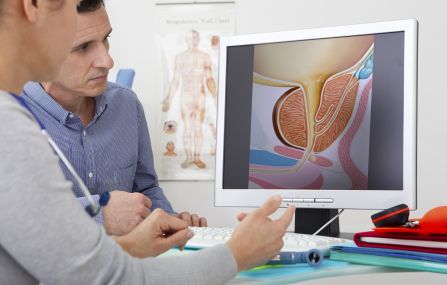 Urology is a medical specialty that focuses on the health and treatment of disorders of the urinary tract and the male reproductive system. Urologists are doctors who are specifically trained to diagnose, treat, and manage these conditions.
Urology is a medical specialty that focuses on the health and treatment of disorders of the urinary tract and the male reproductive system. Urologists are doctors who are specifically trained to diagnose, treat, and manage these conditions.
Why See a Urologist?
Here are some reasons you might seek care from a urologist:
Men can consult a urologist for:
- Prostate conditions, such as an enlarged prostate
- Erectile dysfunction
- Infertility
- Testicular pain or lumps
- Blood in the urine
- Urinary tract infections (UTIs)
- Kidney stones
Women can consult a urologist for:
- Frequent urinary tract infections (UTIs)
- Incontinence or other urinary leakage problems
- Urinary tract injuries
- Kidney stones
- Blood in the urine
The Urological Examination Process
A urological examination generally begins with a detailed medical history, followed by a physical examination. Further diagnostic tests may include urine tests, imaging tests (like ultrasounds or CT scans), and potentially a biopsy or cystoscopy, depending on the symptoms and concerns.
The Benefit of a Second Opinion for Urological Cancers
Getting a second opinion for urological cancers can provide patients with additional perspectives and options for treatment, helping them to make an informed decision about their healthcare journey.
Prostate Biopsy
A prostate biopsy involves removing small samples of prostate tissue to examine under a microscope. This procedure helps detect prostate cancer, determine the severity of the disease, and inform treatment plans.
Catheter Insertion, Replacement, and Flushing
Catheter insertion is a procedure in which a tube is placed in the body to drain urine from the bladder. The catheter may need to be replaced regularly to maintain hygiene and prevent infection. Flushing a catheter, done under professional guidance, can keep it functioning effectively.
Cystoscopy
A cystoscopy allows your urologist to view the inside of the bladder and urethra using a thin, lighted instrument called a cystoscope. This diagnostic procedure helps detect any abnormalities or issues that might be causing symptoms.
Comprehensive Prostate Screening (PSA, FREE PSA, UH)
PSA, or Prostate-Specific Antigen, is a protein molecule produced by the prostate gland's cells. A PSA test involves a blood draw to determine the PSA level, which can help in diagnosing prostate cancer.
The Free PSA test is used to determine whether an enlarged prostate is benign or malignant.
The purpose of prostate ultrasound is to visualize the prostate, which can be done either through the abdomen or through the rectum.
The comprehensive prostate screening consists of two steps: first, we need to conduct a laboratory test, and a few days later, with the lab result (which we usually send to our patients by email the day after the lab test), the patient needs to visit the specialist's office.
PROSTATE SCREENING
Our institution offers an opportunity for men over 40 to quickly and easily complete prostate screening.
The three tests needed for screening are performed simultaneously.
1. Blood Test in Laboratory
 |
In the case of an emerging disease, the level of PSA (Prostate Specific Antigen) detectable from the blood definitely increases, which is indicated by the result of the laboratory test. However, it is important to know that even with a positive result, further examinations may not confirm the presence of prostate cancer. |
2. Manual Prostate Examination
 |
The manual examination of the prostate through the rectum - which some people are apprehensive about - is painless, performed with discretion and gently by the doctor. Based on the palpation, conclusions can be drawn about possible existing diseases, such as benign prostate enlargement, chronic prostatitis, or prostate cancer. |
3. Prostate Ultrasound Examination
 |
The ultrasound examination provides an immediate feedback and image of the state of the prostate. With it, even prostate cancer not yet causing symptoms can be screened out with high probability. |
Information Before Prostate Screening
Intensive physical exercise, long-term cycling, prostate massage, rectal prostate examination, and sexual intercourse can raise PSA levels, so it is advisable to abstain from these effects for two days before a PSA examination.
The ultrasound examination can be successfully performed with a full bladder, so it is advisable to consume plenty of fluids and refrain from urinating before arriving for the screening examination.
Information About Screening Results
After the completion of the laboratory examination, our specialist will compare the results of the three examinations performed. If the combined evaluation of the results raises the risk of a treatable lesion, our institution will contact you.
Please come for a urological examination with a full bladder!
PRESCRIPTION WRITING:
- We can only prescribe a prescription to a patient who has already visited our institution and for whom the prescription has been previously prescribed. For more information: https://dunamedicalcenter.org/en/news/we-help-you-not-to-be-without-medicine
- There is no extra cost for a prescription written during a specialised visit.
- The prescription(s) will be written during the doctor's office hours.
FOREIGN LANGUAGE DOCUMENT:
- All findings, results and outpatient forms are in Hungarian.
- If you would like it in English, you must notify us in advance, and there is an additional cost.
-
Bladder endoscopy - CystoscopyFrom 86 000 Ft
-
Catheter insertion, replacement, flushingFrom 25 000 Ft
-
Cost of prescription issuance outside a specialist consultationFrom 7 000 Ft
-
Histology - prostate biopsy more than 20 samplesFrom 245 000 Ft
-
Histology - prostate biopsy up to 12 samplesFrom 145 000 Ft
-
Histology - prostate biopsy up to 20 samplesFrom 200 000 Ft
-
Prostate complex screening, PSA, free PSA, ultrasound with specialist consultationFrom 61 000 Ft
-
Urological control examination (Important: Please come to the examination with a full bladder!)From 32 000 Ft
-
Urological examination (Important: Please come to the examination with a full bladder!)From 37 000 Ft




